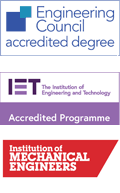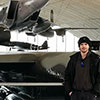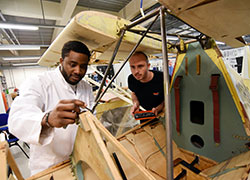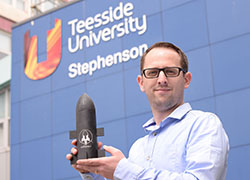Course overview
Accredited Foundation year Integrated masters Work placement
BEng (Hons) Aerospace Engineering
Student, Godly Shagee talks about his experience of studying aerospace engineering at Teesside University
You develop your knowledge and understanding of aerospace engineering subjects, including design, fluids, mechanics, flight control systems, structures, materials, propulsion, flight dynamics and aircraft performance.
Top reasons to study aerospace engineering at Teesside:
- International visits: you have opportunities to travel internationally through student mobility visits or spending a semester studying abroad with one of our partners in countries such as China, the Czech Republic, Spain and Malaysia.
- Prepare for your studies: develop your understanding of maths with our free online Mathematics for University course.
- Graduate Success: 90% of BEng (Hons) Aerospace Engineering students go on to work and/or study 15 months after the course (Graduate Outcomes Survey 2019-20 and 2020-21, tees.ac.uk/source).
- Student satisfaction: Teesside University was ranked 4th for Student Satisfaction for Aeronautical & Aerospace Engineering in the Complete University Guide 2025. (33 institutions were ranked, tees.ac.uk/source).
- Quality teaching: 100% of aeronautical and aerospace engineering students agreed that teaching staff supported their learning. (National Student Survey 2024, tees.ac.uk/source).
You are taught mainly at the University’s campus in Middlesbrough, but you have access to the extensive aerospace engineering workshops at Hartlepool College of Further Education. These include a hanger with fixed-wing and rotary-wing aircraft, engines, and a wind tunnel. Free transport is provided between the University and the college should you need it.
Course details
Course structure
Year 1 core modules
This is a group project module which is part of the group project theme running through the engineering programmes. This module introduces you to the practice of creating an engineered design and the organisational issues of controlling a group project. It will provide you with the opportunity to work in a team in order to solve a well defined problem. It will give you an understanding of their knowledge and limitations and the importance of working with other members of a team. There is one week long assignment period allocated to this module and this allows the real time application of skills and knowledge developed in the preceding weeks to be applied to enable manufacture of the designed product. Each group of students will be expected to produce a tangible output from the design and manufacturing work which will account for 60% of the module. For the remaining 40% of marks you will be assessed on the group work process.
This module will introduce you to the fundamentals of electrical circuit theory and how to apply it to analyse simple electric circuits. The module will also introduce you to electromagnetic energy conversion and AC power.
The module is taught with lectures, seminars and related practical work. Your lectures will provide an explanation of principles and discussion of applications. Practical sessions will provide you an opportunity to develop practical skills through the use of laboratory setups that reinforce the lecture material.
This module introduces the range of mathematical skills that are relevant to an engineering degree. You revisit and develop your knowledge of the fundamentals of algebra, trigonometry and basic statistics. The central ideas of vectors, matrices, complex numbers, and differential and integral calculus are also examined.
Throughout the module you develop a range of mathematical skills and techniques fundamental to the solution of engineering problems. You also advance your skills in selecting and applying mathematical techniques.
This module is delivered through a combination of lectures and tutorial sessions.
You look at engineering materials in lab-based practical sessions. Fundamental relationships between processing, structure, properties and performance are explored to highlight factors which influence the suitability of materials for various engineering applications.
This module introduces common types of structure used in engineering, assesses the types of loads they must resist and provides you with the analytical skills necessary to design the components that make up the structure.
Specific areas of study include: basic concepts of force, stress and strain; properties of materials and sections; analysis of frames, beams and columns; equilibrium conditions and statical determinacy; beam bending movement, shear force and deflection; and lightweight cables.
Lectures will introduce each major topic on the module with tutorials used to practise calculations. Laboratory practicals are used to investigate the properties of construction materials and develop a deeper understanding of structural theory.
The module is assessed by in-course assignment and an examination, comprising calculations and short answer questions on the module indicative content.
This module introduces the student to the basic principles of fluid mechanics, properties of fluids, hydrostatics, continuity equation, Bernoulli's equation, flow measurements, real flow in pipes, friction losses and momentum equation. It deals with the transfer of heat, energy for solids, liquids and gases. It explores the various mechanisms for this heat transfer and laws of thermodynamics, quantifies these mechanisms and applies them to mechanical systems, principally engines and compressors.
Year 2 core modules
Aeroengines and Rocket Science
You look at the fundamental thermodynamics and operational characteristics of a range of engines and their components including gas turbines, jet engines, turbofans, turboshaft engines, ramjets, scramjets and rockets (which are used in aerospace applications) and torque power producing gas turbines (used in industrial and marine applications).
You explore the fundamental thermodynamics of engine operation, the equation for thrust calculations, Mach number, stagnation properties, shock waves, steady one dimensional flow, and analyses of flows through convergent and convergent-divergent nozzles. You learn how to calculate the performance and efficiencies of the engine and its components.
Components include burners and afterburners, compressors, turbine and nozzles. You also look at the calculation and analyses of flows through compressor and turbine blading stages, and fundamentals of rocket propulsion, trajectory analysis, and performance of solid and liquid rocket engines.
You attend a series of keynote lectures as well as problem-solving tutorials and practical investigations.
Aircraft Performance and Stability
This is a group project module which is part of the group project theme running through the engineering programmes. This module will provide you with the opportunity to work in teams in order to solve industrially relevant design problems. In the course of this module, you will develop employability skills such as project management, presentation of work, research and commercial awareness in order to support problem solving in a technical context.
This module develops your ability to use theoretical principles to the practice of creating an engineered design item, through group working activities. A problem based learning approach is adopted and where appropriate, supporting lectures/ seminars will be delivered to include technical knowledge or skills development. You will be assessed through two in-course assignments.
This module studies the relationships between the external loads applied to a deformable body and the intensity of internal forces acting within the body, and the characteristics of the materials often found in aerospace applications. The subject also involves calculating the deformations and stability and stability of a body when the body is subject to external loadings.
The module will develop the essential theory and fundamental principles of structural mechanics and will provide an insight into different materials and their characteristics, thus developing student knowledge, skills and ability to apply this knowledge in aerospace structural analysis and design.
Lectures on basic principles and then applications through analysis and laboratory experiments. There is an increasing emphasis on self learning and the use of computational simulation.
Assessment will be in the form of written laboratory reports and an examination.
Avionics and aerospace systems are major constituents of all modern aerospace vehicles on which their overall performance and safety is critically dependent. This module considers the development of avionics, investigates the principles that underpin avionic systems operation and examines the current types and applications of avionic systems in use. The module develops your understanding of the engineering issues related to the specification, design and operation of aerospace systems and their overall performance and safe operation by providing an introduction to the types of systems found on aerospace vehicles and their main functions.
The module introduces the fundamental principles and concepts for avionics design including radio and radar technology, navigation systems, flight management systems and automatic flight control systems and focuses on the design and operation of hydraulic and flight control systems using standard engineering tools.
We use a variety of learning and teaching methods to create and maintain your involvement including lectures, practical activity using a flight simulator, assignments, presentations, seminar exercises and tutorials.
The module is assessed via an assignment and end-of-course exam.
This is a 20-credit module.
Dynamic Analysis and Aeroelasticity
Engineers are responsible for the design, construction, and testing of the devices we use. In doing so, they need a deep understanding of the physics that underpins these devices, and must be familiar with mathematical models that predict system behaviour. You learn how to analyze and predict the behaviour of physical systems by studying mechanics.
Dynamics is a branch of elementary mechanics that studies the object in motion. The results obtained from dynamics directly apply to many fields of engineering. This module develops the essential theories and fundamental principles of dynamic and vibration analysis, and enhances your knowledge, skills, and ability to apply them to the analysis of dynamic and vibration problems.
Integral Transforms and Matrices
You deepen your mathematical knowledge in key areas to use in a number of techniques to solve problems that arise in engineering domains. You develop competence in identifying the most appropriate method to solve a problem and its application.
You are introduced to the techniques and principles, and you are provided with problems that develop your competency in applying these techniques. You are shown how to implement numerical methods using software techniques.
Optional work placement year
You have the option to spend one year in industry learning and developing your skills. We encourage and support you with applying for a placement, job hunting and networking.
You gain experience favoured by graduate recruiters and develop your technical skillset. You also obtain the transferable skills required in any professional environment, including communication, negotiation, teamwork, leadership, organisation, confidence, self-reliance, problem-solving, being able to work under pressure, and commercial awareness.
Many employers view a placement as a year-long interview, therefore placements are increasingly becoming an essential part of an organisation's pre-selection strategy in their graduate recruitment process. Benefits include:
· improved job prospects
· enhanced employment skills and improved career progression opportunities
· a higher starting salary than your full-time counterparts
· a better degree classification
· a richer CV
· a year's salary before completing your degree
· experience of workplace culture
· the opportunity to design and base your final-year project within a working environment.
If you are unable to secure a work placement with an employer, then you simply continue on a course without the work placement.
Final-year core modules
In the aircraft industry, there will continue to be a need for competent engineers skilled in structural design and analysis. Such an engineer will have a sound understanding of aerospace materials and experience in the use of computer based structural analysis. You gain an understanding of the material science and engineering necessary to appreciate the structure-property relationships involved in the principal metals, alloys, polymers, ceramics and composite materials used in the construction of aircraft and space vehicles. You are introduced to finite element analysis using industry standard software. You consider how to select appropriate materials for the different parts of an aircraft structure and how to analyse the performance of that structure to the loads applied to it.]
Aerodynamics is an applied science which finds practical application in many areas of engineering. Irrespective of the complexity of a particular problem, the use of aerodynamics is typically aimed to provide insight into either the loadings on a body moving through air or determination of airflows moving through or around physical systems. This module aims to give a broad introduction to aerodynamics, developing the fundamentals of the discipline and applying these to a number of examples and case studies involving both streamlined and bluff bodies. A key aspect of the module is to provide practical experience of the use of computational fluid dynamics (CFD) software to analyse a variety of flows. Lectures will be used to introduce techniques and underlying principles. Tutorials will provide the opportunity for you to deepen understanding and develop competence in the application of these. Assessment is by an in-course written report and an end examination.
This module aims to provide you with the capability to design and analyse electrical power circuits and systems. You learn a broad range of topics related to generation and conversion of electrical power.
The module is delivered through a combination of lectures, guided reading, laboratory sessions and tutorials. Extensive use of modern experimental facilities will give you the opportunity to explore electrical power systems and to gain a deep understanding of practical constraints.
This module aims to introduce the equations of motion for rigid symmetrical aircraft, to develop simplified models for characteristic motions and to enable students to understand the response of an aircraft to control inputs and disturbances. It develops the concepts of classical control and applies these to controlling an aircraft. The module also introduces the notion of computer programming as a tool to enable development and design in flight dynamics and control.
The module will be delivered via lectures, seminars and IT laboratories.
Assessment will be via an assignment of no more than 1500 words and a 3 hour time-constrained assessment.
This module extends the development of independent learning skills by allowing you to investigate an area of engineering or technology for an extended period.
You receive training in writing technical reports for knowledgeable readers and you produce a report or dissertation of the work covered. In addition, you give an oral presentation, a poster presentation or both. The topic can be in the form of a research project or a design project.
You develop key skills in research, knowledge application and creation through keynote lectures where appropriate and self-managed independent study. Support is provided through regular tutorial sessions.
Modules offered may vary.
How you learn
You learn through lectures, seminars and hands-on lab sessions. You are also expected to undertake self-guided study to review lecture notes, prepare coursework assignments, work on projects and revise for assessments.
You undertake occasional visits to the aerospace engineering workshops at Hartlepool College of Further Education. Free transport is provided between the University and the college.
How you are assessed
You are assessed through coursework assignments, project reports and formal exams.
Our Disability Services team provide an inclusive and empowering learning environment and have specialist staff to support disabled students access any additional tailored resources needed. If you have a specific learning difficulty, mental health condition, autism, sensory impairment, chronic health condition or any other disability please contact a Disability Services as early as possible.
Find out more about our disability services
Find out more about financial support
Find out more about our course related costs
Entry requirements
Entry requirements
96-112 UCAS points including maths, from any combination of acceptable Level 3 qualifications including A-level, BTEC, Access to HE Diploma, Scottish and Irish Highers, T-Level, or the International Baccalaureate.
We accept the following T-Levels:
- Design and Development for Engineering and Manufacturing
- Design, Surveying and Planning for Construction (specialism Civil Engineering)
- Maintenance, Installation and Repair for Engineering and Manufacturing from City & Guilds.
See the full list of level 3 qualifications and how many points your qualifications are worth by using the UCAS tariff calculator.
Accredited prior learning
You may be able to join onto year two or three if you’ve studied a HNC or HND. If you don’t have a qualification but have gained relevant credits at Level 4 in a related subject, then credit transfer may be possible.
Alternative routes into this course are available if you have not met the entry requirements as listed.
International students who need a student visa to study in the UK should check our international web pages on acceptable international qualifications and UKVI-compliant English language requirements.
For general information please see our overview of entry requirements.
International applicants can find out what qualifications they need by visiting Your Country.
You can gain considerable knowledge from work, volunteering and life. Under recognition of prior learning (RPL) you may be awarded credit for this which can be credited towards the course you want to study.
Find out more about RPL
Employability
Career opportunities
We prepare you for the world of work by giving you the opportunity to go on work placements, take part in industry events and to undertake industry-relevant project work.
You gain skills relevant to the aerospace industry and other sectors including automotive, process, oil and gas, electronics, electrical engineering, manufacturing and energy industries.
Our Student Futures careers and employability team can help you map out your future career.
Aerospace engineering graduate destinations include employers such as: BAE SYSTEMS, Cobham, Baker Hughes, Express Engineering Ltd, Ford Aerospace Ltd, and many others.
Working as an aerospace engineer.
Information for international applicants
Qualifications
International applicants - find out what qualifications you need by selecting your country below.
Select your country:
Useful information
Visit our international pages for useful information for non-UK students and applicants.










 BEng (Hons) Aerospace Engineering
BEng (Hons) Aerospace Engineering  BEng (Hons) Aerospace Engineering (Extended)
BEng (Hons) Aerospace Engineering (Extended) BEng (Hons) Aerospace Engineering with industry
BEng (Hons) Aerospace Engineering with industry Royal appointment for student start-up company
Royal appointment for student start-up company Ambitious projects set students on a journey to success
Ambitious projects set students on a journey to success Space launch company wins prestigious award
Space launch company wins prestigious award